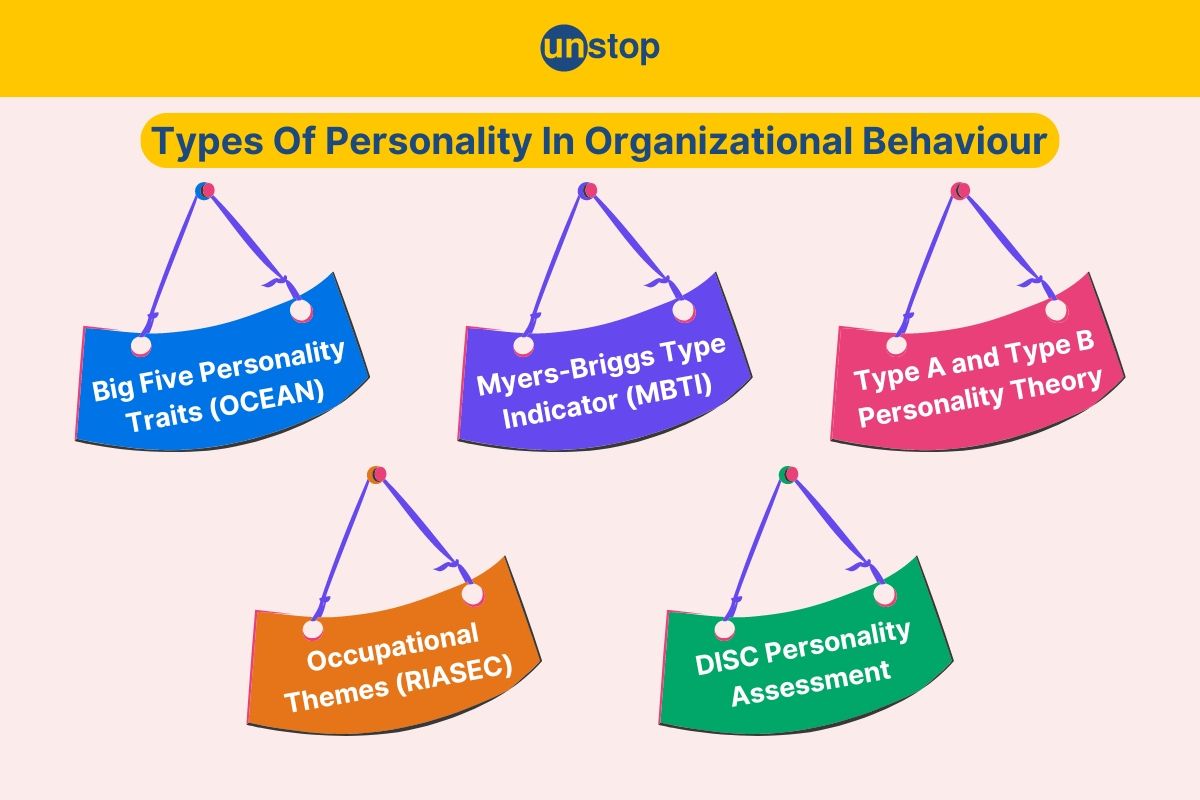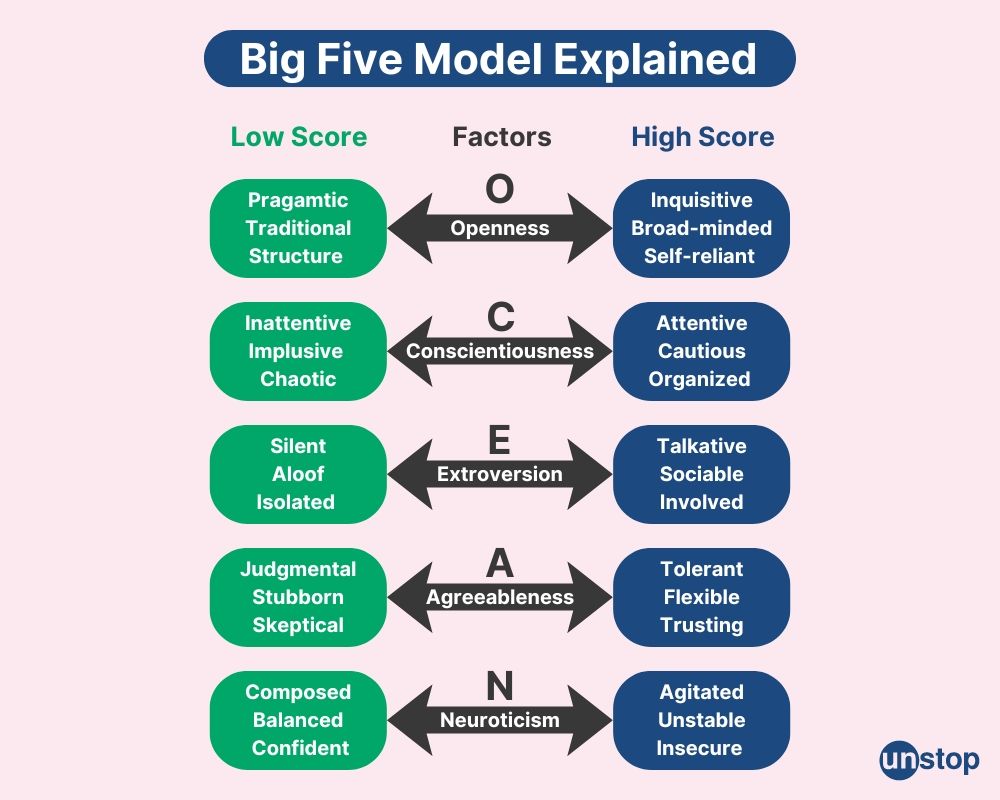- Definition Of Personality In Organizational Behaviour
- Importance Of Personality In OB
- Types Of Personality In OB
- The Big Five Personality Traits (OCEAN)
- Myers-Briggs Type Indicator (MBTI)
- Type A And Type B Personality Theory
- Holland's Occupational Themes (RIASEC)
- DISC Personality Assessment
- Theories Of Personality In OB
- Determinants Of Personality In OB
- Implications Of Personality In OB
- Conclusion
- Frequently Asked Questions (FAQs)
Personality In Organizational Behaviour- Types, Theories And More

Understanding personality in organizational behaviour (OB) is key to unlocking the dynamics of workplace interactions. By delving into how individuals' traits, behaviours, and values impact team dynamics and performance, organizations can cultivate a harmonious and productive work environment.
Embracing the nuances of personality in organizational behaviour fosters a culture of empathy, collaboration, and personal growth within teams. Dive into the realm of organizational behaviour to harness the power of personality for enhanced teamwork and overall success.
Definition Of Personality In Organizational Behaviour
To begin, let us understand the definition of personality and its relation to organizational behaviour:
Personality
An individual's personality is a unique mix of traits that impact how they think, feel, and act in different scenarios. It's a dynamic and organized collection of characteristics that shape behaviours, emotions, motivations, and thoughts.
It encompasses consistent patterns of thought, feeling, and behaviour that persist across time and contexts, shaping how an individual interacts with their environment and perceive themselves and others.
Personality In Organizational Behaviour
Personality in organizational behaviour refers to the unique traits, behaviours, and characteristics that individuals exhibit in a work environment. It influences how individuals interact with others, perceive situations, and make organizational decisions.
Importance Of Personality In OB
Personality plays a crucial role in organizational behaviour as it affects employee motivation, job satisfaction, communication patterns, leadership effectiveness, teamwork, and organizational culture.
Understanding individual differences in personality helps managers make informed decisions regarding recruitment, selection, training, performance management, and conflict resolution.
Moreover, fostering a positive work environment that values diversity of personalities can enhance employee engagement and organizational effectiveness.
Types Of Personality In OB
Here are some common personality types and frameworks relevant to organizational settings:
Big Five Personality Traits (OCEAN)
Myers-Briggs Type Indicator (MBTI)
Type A and Type B Personality Theory
Holland's Occupational Themes (RIASEC)
DISC Personality Assessment
The Big Five Personality Traits (OCEAN)
The Big Five model helps us grasp and explain how people differ in personality through five main dimensions. It is widely used in research, clinical practice, and various other fields to assess personality traits and their implications for behaviour, relationships, and well-being. Each letter in OCEAN represents one of the following traits:

Openness to Experience (O)
-
Characterizes individuals who are imaginative, curious, open-minded, and receptive to new ideas and experiences.
-
Individuals with higher scores tend to be creative, adventurous, and willing to explore unconventional ideas and perspectives.
-
Low scorers may prefer routine, tradition, and familiarity and may be more resistant to change.
Conscientiousness (C)
-
Reflects the degree to which individuals are organized, responsible, disciplined, and goal-oriented.
-
High scorers are reliable, hardworking, and conscientious in their approach to tasks and responsibilities.
-
Low scorers may struggle with impulsivity, procrastination, and disorganization.
Extraversion (E)
-
Describes individuals who are outgoing, sociable, energetic, and assertive in social situations.
-
High scorers are often seen as sociable, talkative, and enthusiastic, and they enjoy being the centre of attention.
-
Low scorers may be more reserved and introverted and prefer solitary activities over social gatherings.
Agreeableness (A)
-
Reflects the degree to which individuals are friendly, cooperative, compassionate, and empathetic towards others.
-
High scorers are typically kind, altruistic, and considerate of others' feelings and well-being.
-
Low scorers may be more sceptical, competitive, and less concerned about others' welfare.
Neuroticism (N)
-
Describes individuals who experience negative emotions such as anxiety, depression, and irritability, as well as emotional instability.
-
High scorers are prone to worry and mood swings and may have difficulty coping with stress.
-
Low scorers tend to be emotionally stable, resilient, and able to maintain a sense of calm and composure in challenging situations.
Myers-Briggs Type Indicator (MBTI)
The Myers-Briggs Type Indicator (MBTI) categorizes personality into 16 distinct types based on four dichotomies: Introversion (I) vs. Extraversion (E), Sensing (S) vs. Intuition (N), Thinking (T) vs. Feeling (F), and Judging (J) vs. Perceiving (P).

Here are the 16 MBTI personality types:
ISTJ (Inspector): Practical, fact-minded, dependable.
ISFJ (Protector): Warm, considerate, conscientious.
INFJ (Counselor): Insightful, inspiring, and dedicated to helping others.
INTJ (Mastermind): Strategic, analytical, and independent.
ISTP (Craftsman): Bold, practical, and logical.
ISFP (Composer): Sensitive, kind, and artistic.
INFP (Healer): Idealistic, empathetic, and values-driven.
INTP (Architect): Innovative, intellectual, and curious.
ESTP (Dynamo): Energetic, perceptive, and spontaneous.
ESFP (Performer): Enthusiastic, sociable, and fun-loving.
ENFP (Champion): Enthusiastic, creative, and sociable.
ENTP (Debater): Inventive, energetic, and outspoken.
ESTJ (Executive): Organized, practical, and leadership-oriented.
ESFJ (Provider): Warm-hearted, conscientious, and cooperative.
ENFJ (Teacher): Charismatic, empathetic, and inspiring.
ENTJ (Commander): Bold, imaginative, and strong-willed.
Type A And Type B Personality Theory
The Type A and Type B Personality Theory is a classification system used to describe two contrasting personality types based on behaviour patterns, stress responses, and risk for certain health issues. This theory was originally developed by cardiologists Meyer Friedman and Ray Rosenman in the 1950s.
Type A Personality
-
Characteristics: Competitive, highly organized, ambitious, impatient, and aggressive.
-
Behavior Patterns: Individuals with a Type A personality are often driven, goal-oriented, and feel a constant sense of urgency. They may struggle with relaxing and tend to take on multiple tasks at once.
-
Stress Response: Type A individuals are more prone to stress and may experience high levels of frustration and anxiety. Their aggressive and competitive nature can lead to conflicts in personal and professional relationships.
-
Health Implications: Research has shown that Type A personalities are at a higher risk for cardiovascular diseases, such as heart attacks and hypertension, due to their high-stress levels and lifestyle.
Type B Personality
-
Characteristics: Relaxed, easy-going, flexible, and patient.
-
Behaviour Patterns: Individuals with a Type B personality are more laid-back, tolerant, and less driven by the need to achieve. They generally handle stress better and are more adaptable to change.
-
Stress Response: Type B individuals are less prone to stress and typically remain calm and composed under pressure. They enjoy a balanced approach to life, valuing relaxation and leisure time.
-
Health Implications: Type B personalities are at a lower risk for stress-related health issues compared to Type A personalities. Their relaxed nature contributes to better overall well-being and lower incidences of cardiovascular diseases.
Holland's Occupational Themes (RIASEC)
Holland's Occupational Themes, also known as the RIASEC model, is a theory of vocational choice and career development developed by psychologist John L. Holland.
According to Holland's theory, individuals tend to gravitate towards work environments that align with their dominant personality themes.
This model has been widely used in career counselling, vocational guidance, and workforce development.
It categorizes individuals into six personality types based on their preferences for different work environments and tasks, with each letter in RIASEC representing a different theme:
Realistic (R)
-
People who are practical, hands-on, and enjoy working with tools, machines, or physical objects.
-
Examples of careers are carpenter, mechanic, farmer, and engineer.
Investigative (I)
-
People who are analytical, curious, and enjoy problem-solving and intellectual challenges.
-
Examples of careers are scientist, researcher, mathematician, and computer programmer.
Artistic (A)
-
People who are creative and expressive enjoy using their imagination and artistic abilities.
-
Examples of careers are artists, musicians, writers, and graphic designers.
Social (S)
-
People who are empathetic, caring, and enjoy helping and interacting with others.
-
Examples of careers are teacher, counsellor, nurse, and social worker.
Enterprising (E)
-
People who are ambitious, outgoing, and enjoy taking on leadership roles and persuading others.
-
Examples of careers are salespersons, entrepreneurs, managers, and politicians.
Conventional (C)
-
People who are detail-oriented, organized, and enjoy working with data, numbers, and established procedures.
-
Examples of careers are accountant, administrative assistant, bank teller, and librarian.
DISC Personality Assessment
The DISC model of personality is a behavioural assessment tool used to understand individual differences in behaviour, communication styles, and workplace preferences.
This model is often used in organizational settings for team building, leadership development, and improving communication and interpersonal relationships.
It categorizes people into four primary personality types based on their tendencies in four behavioural dimensions:
Dominance (D)
-
Characteristics: Direct, decisive, assertive, and results-oriented.
-
Communication Style: Prefers to take charge, make decisions quickly, and focus on achieving goals.
-
Workplace Preferences: Thrives in leadership roles, enjoys challenges, and values autonomy and control.
Influence (I)
-
Characteristics: Sociable, enthusiastic, persuasive, and optimistic.
-
Communication Style: Outgoing, expressive, and enjoys engaging with others in social settings.
-
Workplace Preferences: Enjoys teamwork, networking, and influencing others. Prefers dynamic and lively environments.
Steadiness (S)
-
Characteristics: Patient, dependable, cooperative, and empathetic.
-
Communication Style: Supportive, diplomatic, and values harmony in relationships.
-
Workplace Preferences: Prefers stability, predictability, and working in a supportive and collaborative team environment.
Conscientiousness (C)
-
Characteristics: Analytical, detail-oriented, systematic, and cautious.
-
Communication Style: Precise, logical, and values accuracy and quality.
-
Workplace Preferences: Enjoys tasks that require attention to detail, planning, and following established procedures. Prefers an organized and structured work environment.
Theories Of Personality In OB
Let us study some of the major theories of personality in organizational behaviour:
Trait Theories
Trait theories propose that personality consists of stable and enduring characteristics that influence behaviour across situations. Early trait theorists, such as Gordon Allport and Raymond Cattell, identified numerous personality traits and dimensions, laying the foundation for subsequent research.
Psychodynamic Theories
Psychodynamic theories, notably Sigmund Freud's psychoanalytic theory, emphasize the role of unconscious processes, childhood experiences, and defence mechanisms in shaping personality. While less prominent in organizational behaviour research, psychodynamic perspectives offer insights into underlying motivations and interpersonal dynamics.
Humanistic Theories
Humanistic theories, including Maslow's hierarchy of needs and Carl Rogers's person-centred theory, focus on self-actualization, personal growth, and the innate drive for fulfilment.
These perspectives highlight the importance of fostering positive work environments that support individual development and well-being.
Social Cognitive Theories
Social cognitive theories, such as Bandura's social learning theory and Rotter's locus of control theory, emphasize the reciprocal interaction between individuals, their environment, and cognitive processes.
These theories explore how observational learning, social modelling, and self-efficacy beliefs shape behaviour in organizational contexts.
Determinants Of Personality In OB
Let us study the determinants of personality in organizational behaviour:
Genetic Predispositions
Certain personality traits are influenced by genetic factors, leading individuals to exhibit particular behaviours and preferences. Studies involving twins and adoptions have shown that personality can be inherited, although the exact genetic processes are still being studied.
Environmental Influences
Environmental factors, including family upbringing, socio-economic background, cultural norms, and educational experiences, shape personality development through socialization processes and life experiences.
Early childhood experiences, in particular, play a significant role in shaping core personality traits and behavioural patterns.
Organizational Context
The organizational context, including organizational culture, leadership styles, job roles, and work environment, also influences how individuals express their personalities in the workplace.
Organizational norms, values, and reward systems can either reinforce or inhibit certain personality traits and behaviours among employees.
Implications Of Personality In OB
Let us also devote some time to studying the implication of personality in organizational behaviour:
Employee Motivation & Job Satisfaction
Being organized, outgoing, and emotionally stable traits are associated with success and satisfaction at work. Individuals who are proactive, resilient, and adaptable excel in dynamic work environments.
Leadership Effectiveness
Successful leadership involves recognizing the unique personalities of team members and adjusting leadership approaches accordingly. Transformational leaders possess charisma, vision, and emotional intelligence, motivating and enabling staff to meet company objectives.
Team Dynamics & Collaboration
Team composition and diversity of personality traits influence team dynamics, communication patterns, and collaborative effectiveness. Balanced teams comprising members with complementary strengths and perspectives tend to outperform homogeneous teams in problem-solving and innovation.
Organizational Culture & Climate
Assessing organizational culture through personalities can ensure that employee preferences match company values, leading to a more positive work environment and increased engagement. This evaluation considers shared beliefs, values, and norms that influence behaviour and decision-making in the workplace.
Conclusion
In conclusion, understanding personality in the workplace is important for improving teamwork and performance. Recognizing how different traits influence behaviour can help build a positive and efficient work environment for everyone involved. Utilizing key personality characteristics can lead to better collaboration and outcomes at work.
Understanding personality in organizational behaviour is crucial for effective talent management, leadership growth, team interactions, and company culture. By accepting various personality traits and using personalized approaches to engage employees, businesses can create an inclusive, innovative, and resilient culture in today's changing business world.
Frequently Asked Questions (FAQs)
1. What is the importance of defining personality in organizations?
Understanding individual differences and behaviours helps optimize team dynamics, enhance communication, and improve employee engagement. By defining personality traits within an organizational context, companies can tailor strategies to boost productivity and foster a positive work environment.
2. How do traits shape behaviour in the workplace?
Personality traits like extraversion, conscientiousness, and openness influence how individuals interact with colleagues, handle tasks, and respond to challenges. These traits impact decision-making processes, leadership styles, and overall job performance within organizational settings.
3. What are the determinants of personality in work environments?
Various factors such as genetics, upbringing, cultural background, and life experiences contribute to shaping an individual's personality. Understanding these determinants can aid in predicting behaviour patterns and conflict resolution strategies and in fostering a supportive work culture that values diversity.
4. How does personality impact work settings?
Personality plays a crucial role in employee motivation, job satisfaction levels, and overall team dynamics. By recognizing how different personalities complement each other or create friction, organizations can implement targeted interventions to enhance collaboration, reduce conflicts, and boost productivity.
5. What are some key personality attributes explored in organizational behaviour?
Commonly studied personality attributes in organizational behaviour include emotional intelligence, adaptability, resilience, integrity, and assertiveness. These attributes are essential for individuals to effectively handle work challenges, communicate with colleagues and supervisors, and promote a positive work environment based on trust and respect.
Suggested reads:
- Personality Assessments For Hiring: Effective Strategy And Benefits
- Models Of Organizational Behaviour- Definition, Types & Theories
- Workplace Anxiety- Causes, Symptoms & Coping Strategies Explained
- What Is A Walk-In Interview? A Guide For Freshers & Professionals
- Reasons For Job Change: Top 10 Best Reasons, Tips And Examples
Instinctively, I fall for nature, music, humor, reading, writing, listening, traveling, observing, learning, unlearning, friendship, exercise, etc., all these from the cradle to the grave- that's ME! It's my irrefutable belief in the uniqueness of all. I'll vehemently defend your right to be your best while I expect the same from you!
Login to continue reading
And access exclusive content, personalized recommendations, and career-boosting opportunities.
Subscribe
to our newsletter













Comments
Add comment